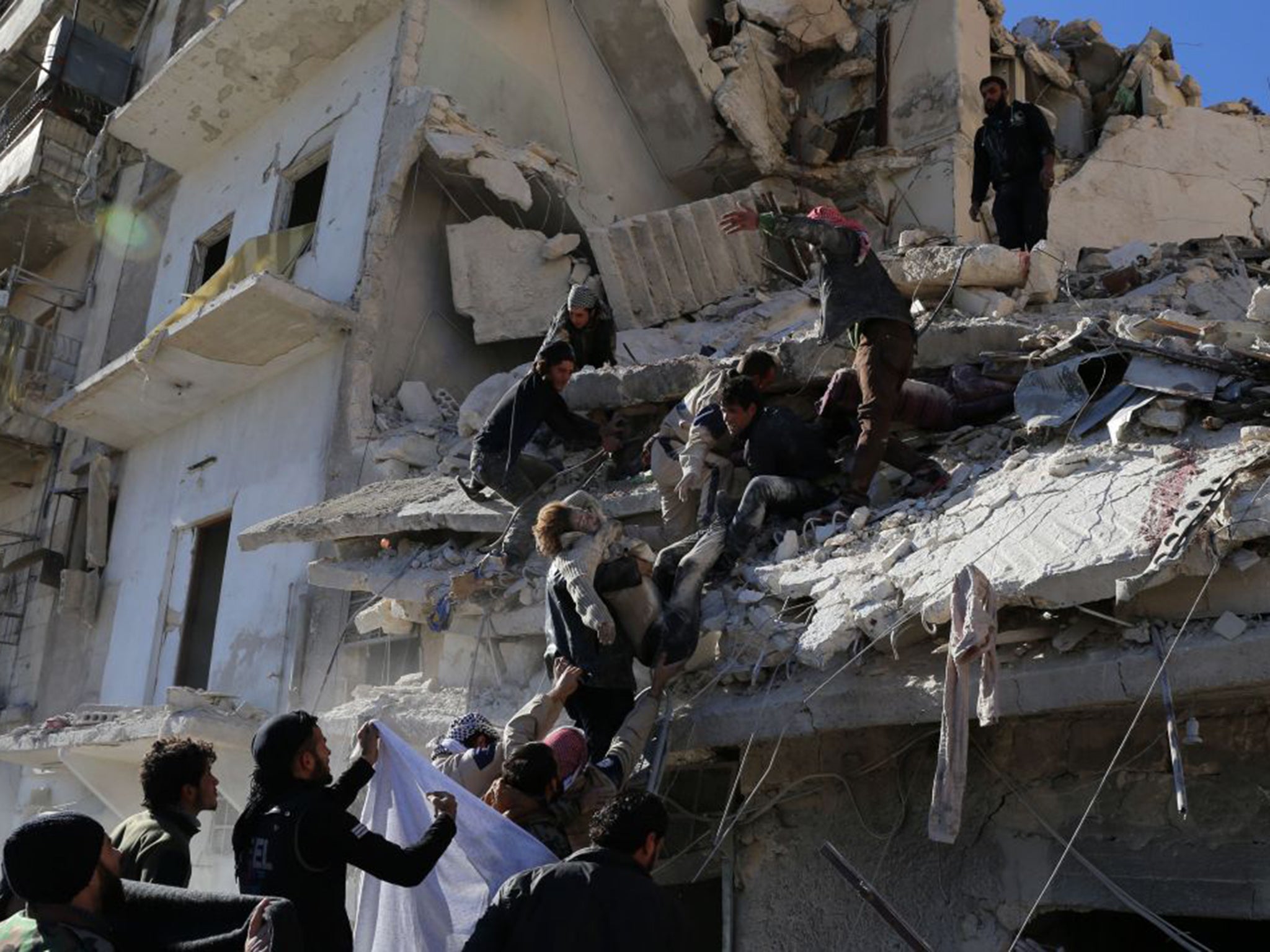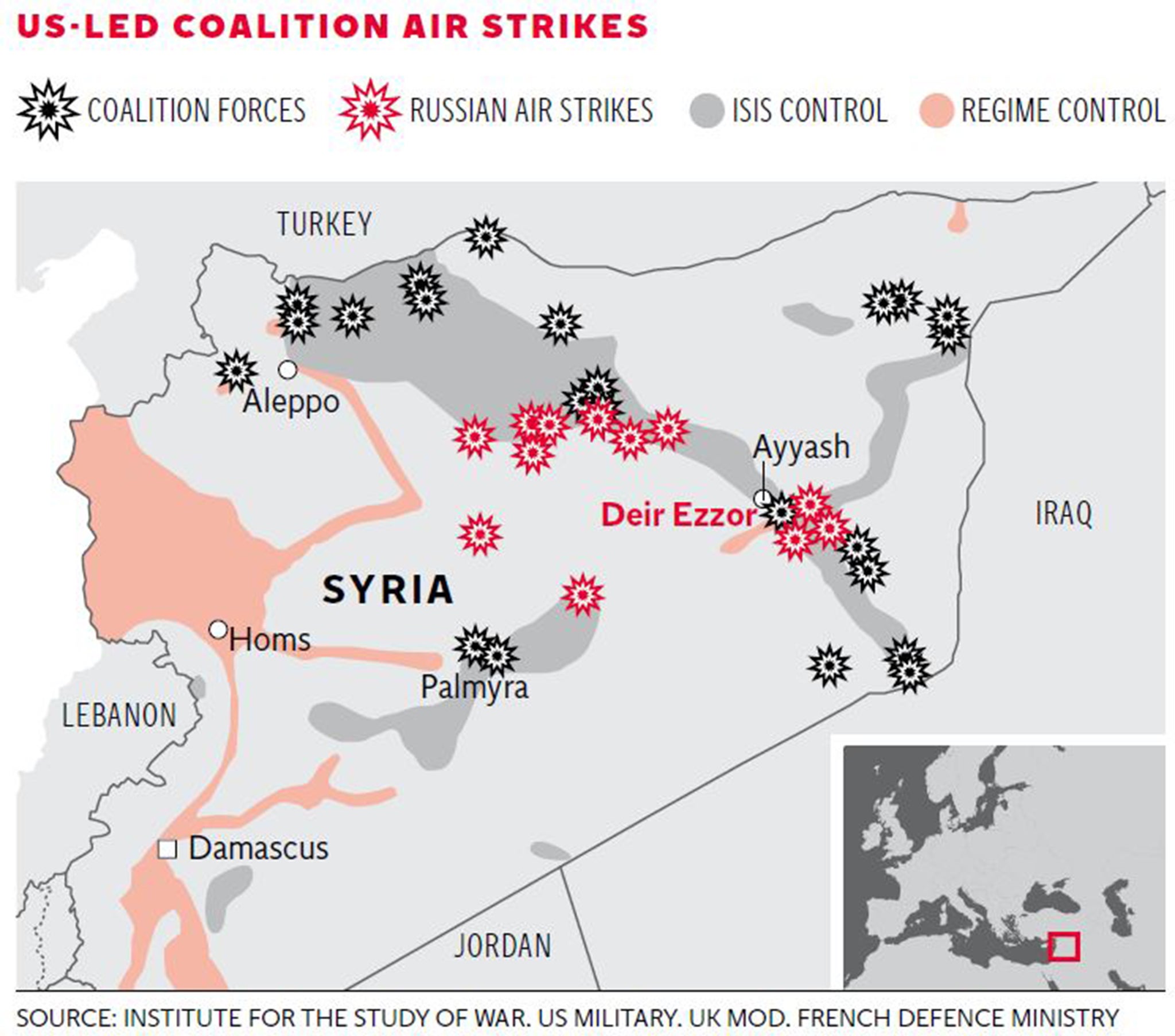Assad blames US for Syria strike that killed three soldiers but America points finger at Russia
Assad regime points finger at United States for deaths of three Syrian army soldiers in eastern province, but Washington accuses Russian bombers over fatal strike on airbase. Laura Pitel reports from Istanbul

Your support helps us to tell the story
This election is still a dead heat, according to most polls. In a fight with such wafer-thin margins, we need reporters on the ground talking to the people Trump and Harris are courting. Your support allows us to keep sending journalists to the story.
The Independent is trusted by 27 million Americans from across the entire political spectrum every month. Unlike many other quality news outlets, we choose not to lock you out of our reporting and analysis with paywalls. But quality journalism must still be paid for.
Help us keep bring these critical stories to light. Your support makes all the difference.
The blame for an air strike that reportedly killed three Syrian regime soldiers has been laid on both the United States and Russia, underscoring the increasingly tangled conflict taking place across Iraq and Syria.
Syria accused the US of “flagrant aggression”, claiming that air strikes by the American-led coalition against Isis had killed the Syrian troops and injured 13 others in the eastern province of Deir Ezzor on Sunday night.
Washington rejected the charge, with officials suggesting instead that it was a Russian strike behind the deaths, but Damascus maintained that the alliance was to blame for the “heinous” assault.
Such an attack would be the first known instance of Syrian government forces being killed by the international coalition, of which Britain is a member.
The row erupted just days after British RAF jets joined air strikes in Syria, and comes amid warnings that the conflict in the country is becoming an increasingly dangerous global proxy war that has pitted the US, Europe, Saudi Arabia and Turkey against Syria, Russia and Iran.
As well as taking sides in the long battle between the embattled President Bashar al-Assad and rebels fighting against him, international powers have stepped into a campaign against Isis fighters who have seized control of a swathe of Syria and Iraq.

The first reports of the strike on the Saeqa army base near the town of Ayyash on Sunday night came from pro-opposition monitoring groups in the early hours of Monday. The British-based Syrian Observatory for Human Rights said jets that it believed were likely to be from the coalition had hit part of the camp, killing four Syrian army personnel.
The Shaam News Network also suggested it was coalition aircraft that had hit the military base, which the Syrian Foreign Ministry said had also destroyed three armoured vehicles, four military cars and a weapons cache.
However, Brett McGurk, Barack Obama’s envoy to the coalition, took to Twitter, saying: “Reports of coalition involvement are false.”
Colonel Steve Warren, a spokesman for the coalition, said there had been four strikes in the province on Sunday but all of them were against oil infrastructure. “Our strikes were approximately 55 kilometres (35 miles) south-east of Ayyash. We did not strike any vehicles or personnel targets. We have no indication any Syrian soldiers were near our strikes,” he said.
Syria’s Foreign Ministry wrote to the United Nations Security Council and Secretary General Ban Ki-moon to condemn what it called “flagrant” and “heinous” aggression.
Deir Ezzor is largely controlled by Isis, but the Syrian government retains patches of control. American strikes have regularly targeted the province, including oilfields that provide income to Isis.
Since its surprise decision to begin air strikes at the end of September, Russia has also hit targets in the province, but Washington insists that they have been largely focused on non-Isis groups fighting the Syrian army.
While the US and its allies remain opposed to President Assad, they have stopped short of using military force against his interests. A US Defence official told Reuters that his military would not attack its Syrian counterpart, saying: “We are not at war with the Assad regime and have no reason to target the Syrian army. We are aware that Russia conducted long-range bomber strikes into Syria yesterday.”
Shashank Joshi, of the Royal United Services Institute think-tank, said that he was sceptical of the claim that the US-led coalition was to blame. “The coalition has had a long time to conduct very careful intelligence gathering,” he said. “I understand how they could hit Syrian troops. To hit an airbase is a rather different question. But mistakes are possible.”
Earlier this month, Turkey became the first Nato member to shoot down a Russian plane in more than half a century after accusing the Su-24 of violating its airspace.
The diplomatic fallout continued as Turkey summoned the Russian ambassador to Ankara after images emerged of a Russian sailor brandishing a rocket launcher as his warship passed through the Bosphorus strait.
Moscow has also announced crackdowns on trade and tourism between the two countries, as well as stepping up its bombing campaign in opposition strongholds inside Syria.
Turkey’s Deputy Prime Minister, Mehmet Simsek, warned that, in the worst-case scenario of “zero relations”, the recriminations could cost Turkey $9bn.
Ankara showed no sign of backing down in a separate row with Iraq over Turkish troops stationed in northern Iraq who Turkey say are there to train Iraqi troops in their fight against Isis. Turkey said it would not withdraw troops who arrived last week despite Iraq warning it to do so within 48 hours.
Subscribe to Independent Premium to bookmark this article
Want to bookmark your favourite articles and stories to read or reference later? Start your Independent Premium subscription today.
Join our commenting forum
Join thought-provoking conversations, follow other Independent readers and see their replies
Comments